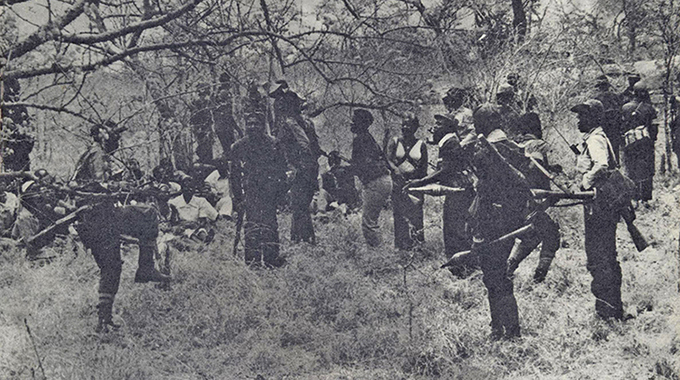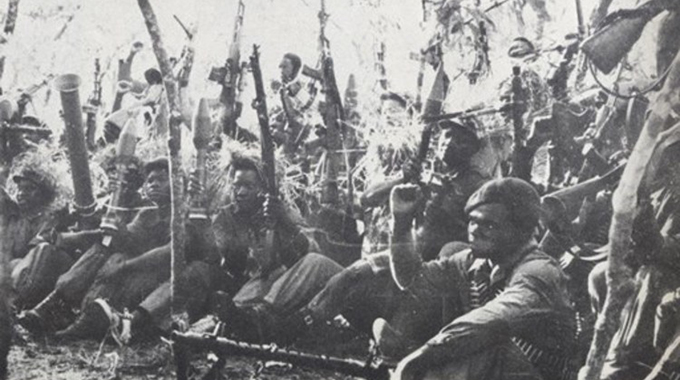He went, he fought, but . . .

Isdore Guvamombe Saturday Lounge Reflections
We were four boys and stayed with several other small girls with our maternal grandparents in Sipolilo, now Guruve, at the height of the war of liberation.
Suffice to say, Sipolilo was the white settlers’ whimsical mispronunciation of Chipuriro.
In the intricate network of rolling valleys and on banks of Chipuriro’s trickling rivers, banana trees grew in families with children of varying ages.
Mature members had distinct tattered yellow leaves and gave birth to bunches of fruit.
The youngest trees were usually short, broad and had untorn leaves. We ate bananas at will, daily.

On the verge of the compound, the bush thickened out, stretching out to stunted Mopane bush shrubbery and grasslands.
Mupinge River, which was close by, seemed too far away because of the war.
Where we used to bath at dusk, we changed and bathed in the afternoon and walked back home before sunset to beat the Rhodesian curfew.
This particular afternoon we noticed some freedom fighters resting in the banana trees along the river.
My brother Phillip, whose other name was Tedius, was a teenager then, and we called him Tadhewu.
As we bathed by the river, I was summoned into a garden and had a small chat with two of the freedom fighters.
It was hard to figure out the conversation.
I was a young boy, still milking behind the ears, but old enough to remember this particular incident.
There was sudden change in Tadhewu’s attitude. He seemed deeply consumed in some thoughts as we bathed and walked home.
We got home at sunset. Granny was winnowing. She deftly held the bamboo-made tray at an angle, agitating in such a way that the clear grain dropped down on the reed mat, while the chaff was blown off by the wind.
The chaff looked like straw-coloured dust and spread thick on the ground and little everything else within reach. A goat intermittently sneaked and gambolled on the chaff.
Grandpa had a stiff neck and walked slowly and tentatively towards his wooden stool, polished smooth by years of use.
He basked in the silhouette sunset in a ghostly gait.
The compound was alive with playing girls, skirts tucked in pants; their sturdy legs already caked with a mixture of dust, mud and dung.
They were bidding the day farewell, too.
Soon we tethered the goats and penned the cattle, as day gave way to night.
It was a short evening.
Tadhewu seemed in a hurry to sleep. Neither granny no grandpa seemed to be in the mood for story-telling.
Our bedroom was an unassuming one room whose grass tottered with age. Its mud-and-pole wall leaned backwards, with a little door that was always not firmly closed. Its two small windows were mere gaps on the wall.
The room kept many secrets; the gossip, the many quarrels, the loud and silent farts, but it remained quiet. The daily fight over the single blanket we shared. The stench of urine.
The night suddenly seemed oppressively silent. Only screeching crickets and the distant hoot of an owl and the howling of a jackal. Sleep took its course and I slid into deep slumber.
As the night slept away, I felt some comforting heat on by side, which quickly died into an uncomfortable coldness.
Sebastian had urinated on me, as usual.
Tadhewu woke us up to wee outside, but Sebastian refused, for, he had already emptied his bladder. There we were, lined up before the bananas in front of our infamous bedroom, with the full moon lighting.
Thereafter, we trooped back into the hut, but Tadhewu, dragged me to stop.
He looked me into the face, stone-faced and whispered; “In the morning, tell granny that the war has called me. I am gone,’’ then he pushed me into the room by the shoulder and closed the door behind me.
I never slept. I peeped through the crevices on the door and saw him walk straight into the bananas. He was gone.
As the first birds chirped and announced the dawn of a new day, I dashed to granny’s bedroom and broke the news.
Both grandfather and grandmother went silent for a moment, then looked at each other as if to say, we saw it coming.
After several moons, the war reached fever pitch and all the schools in Nyakapupu closed.
We were then moved to a protected area or “Keep” some 20km away at Shinje.
This was now 1978.
We were only allowed to leave the fence at 8am and back at 4pm and as young boys we left the keep to hunt for birds and hares.
We were considered too young and too innocent to participate in the war on either side.
Our favourite hunting place was riverine vegetation of Shinje River, because of its proximity to the “Keep”.
One day we went further up the river close to its source somewhere near Chengoma Farm and that must have been some 10km away.
There, we bumped into freedom fighters who quickly befriended us and asked us many questions about the soldiers and the Keep.
They were clad in jeans, heavy booths and jackets. I noticed Tadhewu in the group.
He took me aside and sent greetings to the family.
“Don’t tell anyone else that you saw me except family members. Tell them we meet in Zimbabwe. All is well. Pass my greetings,’’ he said, turning his back and disappearing into the bush.
He was now very dark, with unkempt hair and brandished an AK47. Tears dropped down my cheeks and I tried to hold back as a I joined the other boys on our journey back to the Keep.
That was the last I saw him.
At independence, everyone in the family waited with bated breath as freedom fighters came back from assembly points.
Tadhewu did not come.
Days turned into moons and moons turned into years and years into decades.
Now, 40 years down the line, Tadhewu has not returned.
He went, he fought, but he never returned.
He paid the ultimate price.
We have no clue, but all we know is he fought to free his country.
We have all accepted that he paid the ultimate price — death.







Comments